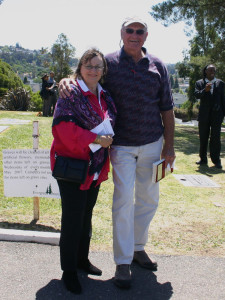
Back in February of this year I participated in a work-related forum with 50 to 75 of my colleagues. When I read the agenda we had been given a week before the event, I was shocked at the items: “Drink the Kool-Aid: How to improve communication between departments.”
As always, my stomach turned when confronted with that statement, but this time, I felt a strong need to confront the slur publicly. I prepared a speech that was as graphic and as short – and yes, as confrontational – as I could make it. After talking to a couple of people about it, though, I realized that I had assumed everyone knows where the expression “Drink the Kool-Aid” came from. Many of the people attending the forum were younger than I am and may have never even heard of Jonestown, much less have made the association with the expression.
During the lunch break, I approached the director in charge and told him there was some very offensive verbiage in the agenda. Fortunately his reaction was completely supportive. “I’ve heard that phrase,” he said, “but I never associated it with Jonestown. You’re right, it is very disrespectful and should not be repeated. If you’re okay with it, I’d like to use this as a teachable moment.”
True to his word, near the end of the day he addressed the forum. “It has been brought to my attention by one of your colleagues that there is some very offensive verbiage in our agenda. I was not aware of the verbiage, but after hearing what your colleague had to say about it, I think we need to listen to her story and allow this experience to heighten our sensitivity so we do not repeat this. Mickey, do you want to proceed?”
I directed everyone to look at the page and item number of “Drink the Kool-Aid,” then continued with the following:
I don’t know how many of you know where the phrase “Drink the Kool-Aid” came from. It’s commonly used in sports, business, standup, politics. But do you know it is referring to the more than 900 people who died in Jonestown, Guyana in 1978, and that 304 of those 918 were children under 18 years? Dozens were babies and toddlers. Seven of those 918 were my family, and as many as are sitting in this room, maybe three times more, I knew personally. All dead in one day.
To be correct, people ingested cyanide poisoning in Kool-Aid, or people were injected with cyanide poisoning. When I hear “Drink the Kool-Aid,” no matter what I’m doing or thinking, I am thrown off course completely and reminded of the worst day of my life, when newspaper headlines across the world screamed of the deaths in Jonestown which included my mother, brother, sister, grandfather, uncle, aunt, and nephew, and all of the other people, many of them friends who died a horrible death.
I don’t know how they died. Autopsies weren’t done, so I don’t know if my family died by ingesting the cyanide or if it was injected. I claimed their ashes, but was it really them? They were ID’d by passport photos but they’d been laying dead face down for two or three days in the jungle heat and moisture. It took me months to realize they were bloated from decaying in the jungle heat and moisture and were not overweight.
I tell you this because I have to speak for my family, for those that died, for those living who lost people. “Drink the Kool-Aid” is insulting, disrespectful, and slurs the memories of our loved ones. Please don’t use it. It isn’t funny. I want it known that this should not appear in any of our professional documents. Perhaps one day it will not be politically correct to say.
The author of the agenda item stood to say she had not meant to be insulting when she included the phrase, and she would be more aware in the future. When the forum ended, a few told me they didn’t like the phrase either. I was congratulated a few times for having the guts to speak up, and have been asked by a few to speak to them about my experience in Peoples Temple. I’m not a great public speaker, and was very concerned that I would not do justice to the subject, but the audience was silent and respectful.
I believe that in the future that phrase will not appear in departmental literature. I also believe the people who were in attendance that day will pause and remember whenever they come across the phrase in the future. I only wish that more people had reason to pause.
(Mickey Touchette is a former member of Peoples Temple.)